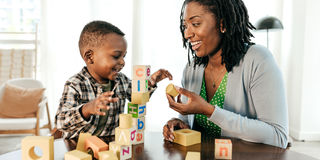Prime
Why parents need to teach children the value of simplicity

Parents can teach their children simplicity, principally by modelling lifestyle. PHOTO/NET
What you need to know:
We exist in the community for socialisation.Raise a child to appreciate the community around them and how they can be part of the solution and not the problem.Promote other-centred as opposed to me-centered.
Henry David Thoreau, an American poet and philosopher was many things. He was an author, philosopher, historian, tax resister, abolitionist, development critic, surveyor, and transcendentalist.
He was an advocate for living a life of simplicity. I found it interesting that a day was set apart for this much-needed virtue in our society today.
The world is richer now materially than it has ever been, and most people are unhappy. At the same time, we have the highest rates of suicide, divorce, drug abuse, family breakdowns, depression, violence, hunger, wars, to mention but a few.
The reasons can be varied, but my guess is one: we have complicated life. The wisest man who ever lived before Jesus, King Solomon, made this poignant observation: “…God made us plain and simple, but we have made ourselves very complicated.” Ecclesiastes 7:29; GNB).
As parents, we need to recapture and teach our children the virtue of simplicity but where should we go to learn it? Pastors who should know better and lead by example, are parasites sucking all they can from their congregants’ pockets, politicians take bribes and compromise their integrity to fatten their bank accounts with no care for the wanainchi they claim to work for…but let us first define what simplicity means.
Simplicity is the intentional letting go of the excess baggage in your life and home and retaining only what is necessary for meaningful and rewarding life experiences. It is sometimes called minimalist living. It is different from asceticism, which is severe self-discipline and avoiding all forms of indulgence, typically for religious reasons; it makes the distinction between the spiritual (good) and physical (evil) .
Parents can teach their children simplicity, principally by modelling the lifestyle, and here are some ways a parent can do that:
Declutter
Some people are addicted to owning too much. They buy every new product on the market in the hope that it will make them feel better or happier. In some extreme cases, this can lead people to keep more than they need and result in a hoarding disorder. Put another way, these are bondages that might take longer to break depending on the degree of the addiction.
Apart from the air you breathe, there should never be anything else that you cannot do away with. Giving breaks the shackles of these addictions and disorders. One of my sons heard me explaining our family name and took it personally. Back in school, he gave away almost all his snacks and when we asked him why he did that, he said he is an “Agaba” and, therefore, a giver. We are working on how to give away moderately, but at least I am glad he understood the lesson.
Sharing does not mean that you have so much to give away, or that you give away what you do not like, but you give away what you have to make another person’s life better. In de-cluttering, besides being a blessing to others, you also create space in your home for your enjoyment.
Use without owning
Richard J. Foster in his classic book, Celebration of Discipline: The Path to Spiritual Growth, writes, “Owning things is an obsession in our culture. If we own it, we feel we can control it; and if we can control it, we feel it will give us more pleasure.The idea is an illusion….enjoy the beach without the feeling that you have to buy a piece of it.” Foster could not have been more accurate. You do not own the air you breathe but you use it.
Should that not be the same approach with which we relate to material things around us? I believe the most important natural things in life are not ours to own, but are rented from God for a time, until we depart here.
Utility vs impressions
Years ago, I gave away a good watch I owned because I saw a gas pump attendant with a similar watch. Cheap impressions got the better of me that day. We like to impress people with high-end product labels and price tags, yet all we should be impressed about a product, should be its functionality.
Someone coined the term, conspicuous consumption or the expenditure on luxuries in an attempt to enhance one’s prestige” is always an exercise in futility as Will Rogers observed: “Too many people spend money they have not earned to buy things they do not want to impress people they do not like.” Let us teach our children to choose values in case they contradict the vanities of their day.
Model contentment
My 11 and 10-year-old sons get bored easily. It is their young nature at this stage in life to want instant gratification and constant stimulation and as a parent, I am expected to provide for these whims. You would think a subscribed DSTV bouquet, bikes, toys, board games, a laptop and their friends just outside the door, would provide good enough company to occupy their time. But they always come up with a “Dad, we are bored.”
Then they like to compare what they have with what their friends have; “Gavin over there has a new tab. May I please have one too?” There is no end to the longing of the eyes.
The more, the better is a lie. If you are not discerning, you will easily fall into the trap to buy more and more toys. You can, however, teach them that broken toys and tools are repaired and reused rather than be thrown away to buy new ones. And if they outgrow a toy, they could look for someone to give it to.




